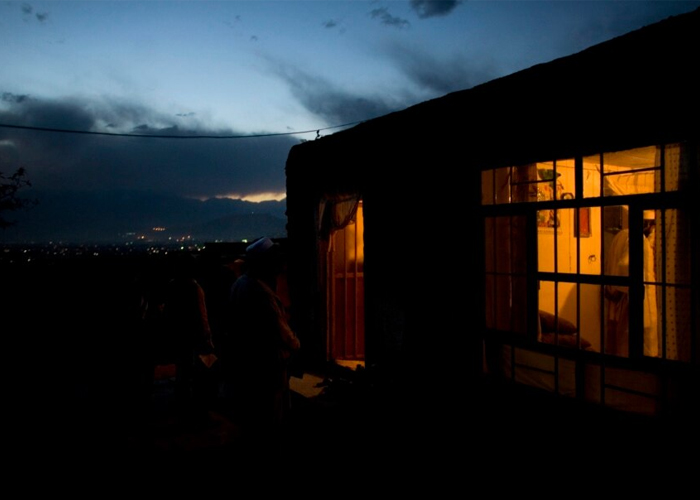Although the power line has temporally been connected, there is no certainty to see the end of electricity disorders in Kabul city. According to Da Afghanistan Breshna Sherkat (DABS), which is responsible for supplying power in the country, 13 imported power pylons in northern Kabul have been completely or partially destroyed by mine explosions in the past two weeks. After the destruction of these pylons, the electricity was cut off in Kabul and at least eight other provinces. The large cities including Kabul were completely dark for nearly two weeks and the Eid days and nights were spent in complete darkness. Based on official reports, six Taliban members were arrested last year as responsible for the destruction of power pylons, but Taliban rejected the responsibility of power pylons disruption in the recent cases.
Unfortunately, the security forces have frequently failed to protect the power pylons and power lines in the country. Within the last few years, Afghan people have frequently been in witness of power’s pylons destruction in the country.
This has not only inflected millions of losses on Breshna Company due to frequent repair and destruction of power bases but also inflected millions of losses on local companies because of work disruption. The local companies are not only disrupted because of power disorders but also because of other issues such as corruption, extortion, damping, target firing, and so on. As a consequence, hundreds of local companies have collapsed in recent years, and the level of unemployment and poverty extremely increased in the country.
The power disorders have caused a lot of public resentment in the country. The people not only criticize terrorist groups because of power disruption in the country but also criticize on Breshna Sherkat because of poor management and unequal power distribution in the country. People complain that the company has not provided electricity during the outage while the powerful people had 24-hour electricity though they pay no electricity bills. The Kabul residents say DABS supply electricity only to palace-dwellers, government officials, and powerful people, not for every home in the remote areas of the city, as witnessed in outage times. Anyway, the power outage crisis is not limited to the security factor in Afghanistan; there are other factors such as corruption, poor management of the Da Breshna Sherkat, insufficient human capacity, corruption, unequal distribution, electricity shortage not paying electricity bills by powerful people, and lack of a strategic plan for producing power inside the country, but the root factor is lack of local investment and electricity shortage, especially during the peak hour and also winter seasons. The current scale of electric power which is imported from the neighboring countries does not satisfy the needs of people though they pay millions of dollars. As a result, the families, local companies, businesses, and health centers are all suffering from the power shortage. Kabul, as a large developing city of Afghanistan, with nearly 7 million population needs around 700mega watt power but it receives some 300/400 megawatt power for the whole families, government offices, ministries, producing companies, business, health centers, and so on. Several years ago, Da Brishna Company promised to solve the problem but nothing has changed yet. Therefore, electric power has changed to a chorionic issue which extremely obsesses public opinion in the country.
Another problem which repeatedly provok public outcry is the increase of electricity price in Afghanistan. A few weeks ago, there were widespread criticisms against Da Brishna Company in objection to increasing electricity cost in the country. Because of the high price of electricity some local companies receive more than a hundred thousand Afghani bills per single month. Therefore, they have no alternatives other than using coal fuel, personal generator, solar electricity, etc. which is either inefficient or considered a dangerous factor to the environment. The companies which depend on solar electricity are not able to work during the night shift and cloudy days while the companies which depend on coal fuel and personal generators are polluting the environment.
Indeed, air pollution is the direct outcome of clean energy shortage and considered more dangerous than terrorists’ threats in the country, especially in large cities such as Kabul.
It means, if we compare the death tolls caused by terrorists and air pollution, there is not much difference between the two factors. Additionally, as aforementioned, it has a lot of negative impacts on the local economy. In recent years, many companies either have stopped working or have not dared to start working due to electric shortage and power disorder in the country. For example, very few people dare to invest in building a cold room in the country due to power issues and so the local fruits and vegetables are whether perished or sold at low prices to outsiders and then a few months later come back to the country with a higher price.
In general, there are various factors why electricity disorders never end in the country.
These factors include insecurity, poor management of the Da Breshna Sherkat, insufficient human capacity, corruption, not paying electricity bills by powerful people, and more importantly lack of a strategic plan for producing power inside the country. In addition to the need for taking decisive actions against the enemies of the enlightenment, we need to move towards self-sufficiency using national resources such as water, solar, coal, gas, wind, and so on, to suffice our domestic needs.
According to the local experts, if we exploit only 5% of our potential resources, it will satisfy the whole national requirements. However, the governments face financial limitedness, but it encourages private sectors to invest in the area of electricity in the country.
Home » Opinion » Public Resentment over Electricity Disorders in Afghanistan
Public Resentment over Electricity Disorders in Afghanistan
| Mohammad Zahir Akbari

